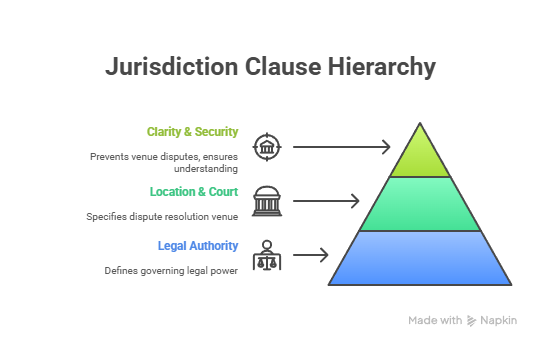When drafting or negotiating a contract, one clause often buried at the end can carry enormous consequences: the jurisdiction clause.
Overlook it, and you risk battling a legal dispute in a foreign country, under an unfamiliar legal system, at great cost. Get it right, and you protect your client or company from legal uncertainty and logistical chaos.
Let’s break it down, step-by-step.

1. What Is a Jurisdiction Clause?
A jurisdiction clause identifies the court or legal system that will have authority to adjudicate any disputes arising under a contract. It does not specify the law that governs the agreement (that’s the role of the governing law clause), but rather where litigation or proceedings will take place.
There are two main types of jurisdiction clauses:
- Exclusive Jurisdiction Clause: The named court or jurisdiction is the only one permitted to hear disputes.
- Non-Exclusive Jurisdiction Clause: A preferred court or jurisdiction is named, but other forums may also be used.
For international contracts, jurisdiction clauses are particularly critical, as parties may be based in different countries and may have different levels of familiarity, comfort, or enforceability in each other’s legal systems.v
2. Why Jurisdiction Clauses Matter
Choosing the right jurisdiction is a strategic decision. It directly affects how a dispute will be handled, the legal framework used, the enforceability of judgments, and the practicalities of hiring legal counsel and gathering evidence.
Key Benefits of a Well-Drafted Jurisdiction Clause
- Certainty and Predictability: The parties know in advance where proceedings will occur.
- Cost Management: Avoids defending or initiating proceedings in multiple or inconvenient jurisdictions.
- Judicial Expertise: Some courts have specialist knowledge (e.g., commercial courts in England or Singapore).
- Neutral Ground: A neutral jurisdiction can reassure both parties in cross-border contracts.
- Judgment Enforceability: Choosing a jurisdiction where the other party has assets increases the chance that a favorable judgment can be enforced.
Illustrative Scenario
In a distribution agreement between a European manufacturer and a Middle Eastern distributor, the absence of a jurisdiction clause led to a dispute being heard in a foreign court unfamiliar to the manufacturer. Despite having a strong legal position, the manufacturer was forced to defend itself in a jurisdiction with unfamiliar legal procedures, incurring significant delays and legal expenses. This situation could have been avoided with a clearly drafted exclusive jurisdiction clause specifying the manufacturer’s home courts.
3. How to Draft a Jurisdiction Clause
Effective jurisdiction clauses are clear, unambiguous, and aligned with the rest of the contract—particularly the governing law clause and any dispute resolution mechanism (such as arbitration).
Model Clauses
Exclusive Jurisdiction Clause
“The courts of [England and Wales] shall have exclusive jurisdiction to settle any dispute arising out of or in connection with this Agreement.”
This clause ensures that only the courts of the specified jurisdiction can hear disputes.
Non-Exclusive Jurisdiction Clause
“Each party agrees that the courts of [New York] shall have non-exclusive jurisdiction to settle any dispute arising out of or in connection with this Agreement.”
This provides a preferred forum while leaving the door open for proceedings in other jurisdictions if necessary.
Jurisdiction in Arbitration Agreements
Although arbitration does not involve courts, the seat of arbitration performs a similar role in determining the supervisory court and procedural law:
“Any dispute arising out of or in connection with this Agreement shall be finally resolved by arbitration under the ICC Rules. The seat of arbitration shall be Paris. The governing law of the Agreement shall be the laws of France.”
Jurisdiction clauses should be tailored to the nature of the contract and the commercial relationship. Below are common formulations based on contract type:
Commercial Sale Agreement (Cross-Border Transaction)
“This Agreement shall be governed by the laws of Germany. The parties submit to the exclusive jurisdiction of the courts of Frankfurt.”
In this case, the seller is based in Germany, and Frankfurt courts offer proximity, enforceability, and familiarity.
Employment Contract
“This Agreement shall be governed by the laws of the State of California. The parties agree to the exclusive jurisdiction of the courts located in Los Angeles County.”
Employment contracts typically rely on local courts due to labor law specificity and to ensure employee protections are enforceable.
Technology License or SaaS Agreement
“This Agreement shall be governed by the laws of the State of New York. The parties agree to the non-exclusive jurisdiction of the courts of New York County.”
Technology providers often deal with international clients. A non-exclusive clause allows them to sue in New York while preserving the ability to enforce contracts in the client’s home country if needed.
Loan or Facility Agreement
“This Agreement shall be governed by English law. The courts of England shall have exclusive jurisdiction to settle any dispute arising out of or in connection with this Agreement.”
Financial institutions often insist on English jurisdiction for its commercial court expertise and the global recognition of English judgments.
Joint Venture Agreement
“This Agreement shall be governed by the laws of Singapore. The parties agree that disputes shall be submitted to the exclusive jurisdiction of the Singapore International Commercial Court (SICC).”
In a joint venture between Asian and European partners, Singapore offers a respected, neutral forum with strong international enforcement potential.
4. Common Drafting Mistakes to Avoid
Omitting the Clause Entirely
Leaving the jurisdiction clause out can result in jurisdictional uncertainty and litigation over where to litigate.
Confusing Jurisdiction with Governing Law
Stating “this contract is governed by the laws of France” without addressing jurisdiction leaves the question of forum open.
Using Vague Language
Avoid phrases like “may” or “can” submit to jurisdiction unless a non-exclusive clause is intended.
Conflict with Arbitration Clause
If a contract includes an arbitration clause, adding a jurisdiction clause regarding courts can create contradiction unless the court clause is strictly limited to ancillary matters (e.g., interim relief).
Choosing a Jurisdiction with No Connection to the Parties
While neutral jurisdictions can be appropriate, they should be chosen with care, especially considering enforcement risks and practicality.
Final Considerations
Jurisdiction clauses are not mere boilerplate. They are essential tools for controlling legal risk, managing dispute resolution strategy, and ensuring cost-effective litigation or enforcement.
A good rule of practice is to:
- Use exclusive jurisdiction when certainty and control are required.
- Opt for non-exclusive jurisdiction when flexibility is needed, particularly in cross-border deals.
- Align the jurisdiction clause with the governing law and arbitration clause (if applicable).
- Consider enforcement realities: where are the other party’s assets located, and where will judgments need to be enforced?
By treating the jurisdiction clause as a core strategic element of a contract, rather than boilerplate, legal teams can prevent major litigation risks and protect their client’s interests.




